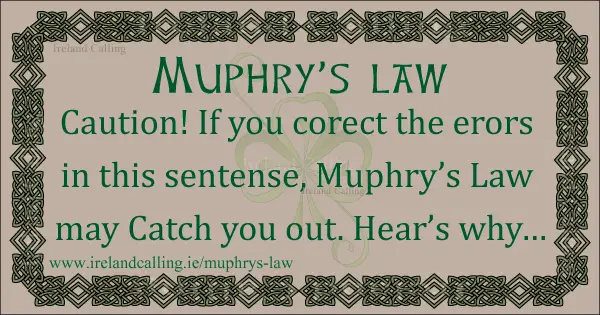Muphry’s Law states that if you highlight errors in somebody’s spelling or grammar, there will be mistakes within your criticism. It also states that the more you criticise, the more mistakes you will make.
It is a deliberate play on words with Murphy’s Law which states that ‘Anything that can go wrong will go wrong’.

Muphry’s Law was coined in 1992 by Australian John Bangsund in a newsletter for the Society of Editors (Victoria). He wrote that:
• (a) if you write anything criticising editing or proofreading, there will be a fault of some kind in what you have written;
• (b) if an author thanks you in a book for your editing or proofreading, there will be mistakes in the book;
• (c) the stronger the sentiment expressed in (a) and (b), the greater the fault;
• (d) any book devoted to editing or style will be internally inconsistent.
Examples of Muphry’s Law

In 2009, the UK Prime Minister Gordon Brown came in for heavy criticism from tabloid newspaper The Sun. Brown had written a letter to the mother of a soldier who had died in Afghanistan but had spelled his surname wrong. The soldier’s name was Jamie Janes but in his letter of condolence, Brown misspelled the surname as ‘James’.
The Sun attacked Brown for having ‘blundered again’ but in doing so spelled the surname ‘Jones’ and had to issue an apology of their own.
Another example saw a writer for the New York Observer taken down a peg or two. The writer had argued: “We all know that the verb “reverted” contains the direction “back” in it. To add “back” is thoroughly redundant. . . . To return is to turn back. Adding the word “back” may appear to solidify your meaning but it only exposes your ignorance.”
The online comment section to the article retorted: “Now, we all know that the verb “contains” already contains the meaning “in it.” To add “in it,” as Phil does, is thoroughly redundant. Adding the phrase “in it” may appear to solidify your meaning but it only exposes your ignorance.”
Write it Right
A similar theory was put forward in 1909 in Ambrose Bierce’s book, Write It Right. Bierce said: “In neither taste nor precision is any man’s practice a court of last appeal, for writers all, both great and small, are habitual sinners against the light; and their accuser is cheerfully aware that his own work will supply . . . many ‘awful examples.’”
Muphry’s Law shows the need to tread carefully when correcting the work of others, or you could end up making worse mistakes yourself.
More popular articles and videos
The real life mystery of what Maureen O’Hara whispered to make John Wayne look so shocked
Matt Damon winning hearts and minds with charm assault on Ireland
Action hero Tom Cruise was once attacked by an old man in a Kerry pub
Liam Neeson speaks about his late wife in emotional interview
Dating site explains why Irish men make wonderful husband material
Billy Connolly says public should ignore politicians and listen to comedians
Take a look inside Hollywood star Saoirse Ronan’s stunning Irish home